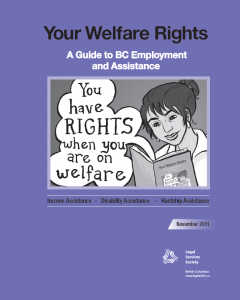Your Welfare Rights
 If you or someone you know have questions about income assistance in British Columbia, you’ll want to have a look at this updated publication from Legal Services Society. Your Welfare Rights: A Guide to BC Employment and Assistance has just been revised and reprinted.
If you or someone you know have questions about income assistance in British Columbia, you’ll want to have a look at this updated publication from Legal Services Society. Your Welfare Rights: A Guide to BC Employment and Assistance has just been revised and reprinted.
This comprehensive guide has been around for 25 years, and includes information on Income Assistance for employable people, Persons with Disabilities benefits, Persons with Persistent Multiple Barriers benefits, and Hardship benefits. The latest edition, in purple, is written in plain language and includes practical tips throughout. It also highlights important information on Persons with Disabilities benefits. Written for people who need to apply for benefits or who are already on income assistance, the booklet explains:
- who is eligible for welfare,
- the application process,
- what benefits are available to you and your family,
- your responsibilities while on welfare,
- how to appeal a decision, and
- where you can get more information or help.
Available online in pdf format, this booklet is regarded by many community workers and public librarians as an invaluable resources to help their clients. You can also order free print copies from Crown Publications (under Quick Links, click Legal Services Society).
Clicklaw has links to Your Welfare Rights and other useful public legal education and information resources on pensions, benefits and welfare programs.

